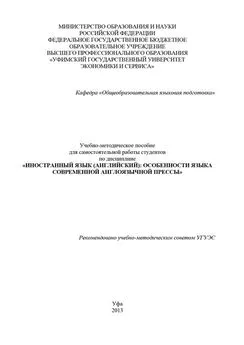Елена Гришаева - Деловой иностранный язык
- Название:Деловой иностранный язык
- Автор:
- Жанр:
- Издательство:неизвестно
- Год:неизвестен
- ISBN:978-5-7638-3296-9
- Рейтинг:
- Избранное:Добавить в избранное
-
Отзывы:
-
Ваша оценка:
Елена Гришаева - Деловой иностранный язык краткое содержание
Деловой иностранный язык - читать онлайн бесплатно ознакомительный отрывок
Интервал:
Закладка:
Е.Б. Гришаева, И.А. Машукова
Деловой иностранный язык Учебное пособие
Introduction
Введение
Учебное пособие построено на коммуникативно-функциональном принципе и предусматривает развитие всех видов речевой деятельности. Представленный материал отражает терминологию основных направлений международной экономической и управленческой деятельности, включая кросскультурные понятия.
Основная цель работы – формирование ряда универсальных и профессиональных компетенций, содержащих инструментальную, коммуникативную, межкультурную и социокультурную, комплексная лингвистическая, практическая и информационно-аналитическая подготовка для выполнения функций, связанных с использованием иностранного языка в профессиональной деятельности, научной и практической работе, в общении с зарубежными партнерами, самообразовательных и других целей.
Пособие состоит из двух частей. В первой – три самостоятельных модуля, включающих в себя разделы (Units). Все разделы структурированы. Изучение материала начинается с постановки задач для конкретного раздела и выстраивается на базе аутентичных текстов (Reading). Каждый текст сопровождается предтекстовыми заданиями (Getting started) и послетестовыми упражнениями, направленными на проверку понимания содержания (Comprehension), развитие лексики (Vocabulary), формирование и развитие навыков говорения (Talking point, Discussion), а также и письма (Writing). Предлагаются и задания повышенного уровня – это ролевые игры (Role-play), проекты (Project) и исследования (Research).
Вторая часть пособия содержит справочный материал, состоящий из трех разделов. Первые два – приложения по письму (Writing References) и говорению (Speaking References), третий – вокобуляр (Vocabulary) к каждому разделу, где приводятся наиболее частые употребления лексических единиц в разных контекстах, примеры приведены к большинству текстов и некоторым другим заданиям.
Учебное пособие имеет практическую направленность. Материал ориентирован на активные методы обучения иностранным языкам.
Module 1
Unit 1. Management
Learning outcomes
▪ Understand how companies are ruled, get to know about the duties and responsibilities of those who are responsible for the governance
▪ Make summaries and learn to make a report
▪ Participate in discussions using your personal experience
▪ Participate in role plays on problems of management
Task 1. Reading 1
Getting started
▪ Before reading the text, discuss in small groups what practical roles play directors in the governing the company. Do they always play the same role or the roles are changed according to the needs of the company?
▪ Skim the first part of the text (A) to find out if your ideas are similar to those in the text.
▪ Read the subheadings in parts B and C and discuss with your peers what each role means.
▪ Make a list of responsibilities that directors have, compare your list with a partner’s, discuss together and come to an agreement. Then read part D and check your ideas.
▪ Discuss in groups of three if directors have responsibilities to shareholders; why, if they have, and what responsibilities are. Then read part E.
▪ How should directors act towards the company? Can you think over some features and qualities that can charaterise their attitude to the members of the company and to work on the whole? Now read part F a nd check your ideas.
▪ Discuss with a partner what you know about theories of corporate governance, then read the last part G to know more about it.
▪ Read the text and consult Vocabulary p. 137–139.
1 1 Some of the material in this chapter appeared originally in 'The non-executive director' in The Director's Manual; Director Books, Simon & Schuster, Cambridge, England, 1990.
A. Roles for Directors
Although a company law tends not to distinguish between different directors, holding them all equally responsible for the governance of the corporate entity, in practice the contributions that different directors make to their board can vary considerably. Moreover, the roles that any director may be called on to play can change over time.
Broadly directors’ activities can be separated into two categories – the performance roles, in which the board is focusing on strategic and policy issues for the future, setting the corporate direction and contributing to the performance of the business; and the conformance roles, in which the board is ensuring that the company is conforming to policies, procedures and plans laid down by the board and being properly accountable for its activities.
In deciding on board nominations, the balance of skills, experience and personal talents of the various directors need to be considered. It can also be important for an effective board that the skills and abilities are appropriately balanced and in harmony, and that members appreciate the roles that are expected of them by their colleagues.
B. The Performance Roles
The first set of roles can be thought of as contributing to the overall performance of the business. We can usefully distinguish a number of different roles within this category, giving each a label for reference.
Contributing know-how, expertise and external information
The first role involves bringing knowledge and experience to bear on issues facing the board. Here the director is drawing on his accumulated experience in business and other similar situations generally. We might call the role that of "the wise man". Long-serving directors may find themselves cast in this role by newer board colleagues.
The second role is that of "the specialist". Here the director relies on his particular professional expertise, skills and knowledge. For example, the expertise might be from the realms of accountancy, engineering or law; or stem from specialist knowledge of a particular international market, technology or financial matter. In some growing companies outside directors are appointed to the board specifically to provide such specialist inputs, until such time as the company acquires such skills at the executive level.
Then there is the role which we could call "the window-on-the-world". Here the director is being used as a source of information on issues relevant to board discussions. Often this will be on matters external to the business, such as insights into marked opportunities, new technologies, financial and economic concerns or international matters. Again this is often a role for outside directors who are in a position to obtain information, through their day to day activities, that is not readily available to the executive directors.
Networking, representing the company and adding status
Another potentially important role, often fulfilled by outside directors, is that of "the contact-person", who is able, through personal contacts, to connect the board and top management into networks of potentially useful people and organizations. For example, the director might be placed to forge contacts in the worlds of government, banking, international trade or political circles. Clearly supplementary to the "window-on-the-world" role, this contribution implies an additional pro-active dimension.
In "the figure-head role" the director is called on to represent the company in the external arena – in meetings with investors and financial analysts, for example, or in trade and industry gatherings. The chairman of the Board often takes on this responsibility, being invited to join public committees, commissions and the governing bodies of important public bodies. Increasingly such directors might be spokesmen for the company with the media.
Then there is a related role of "the status-provider". In the past it was sometimes the case that eminent public figures were invited to join boards, because of their public distinction rather than any specific contribution that they could make to board deliberations. Today business acumen, professionalism and the ability to contribute directly to board affairs are usually expected. But cases can still arise where the bringing of reputation, status, even credibility to a board is important. If the company has been through financial difficulties and needs to rebuild confidence with the financial markets, or has had problems with products or services in the market place and needs to rebuild customer confidence, such an appointment can be valuable.
C. The Conformance Roles
The above six roles are oriented towards improving the performance of the company through better strategic thinking and policy making. The following six roles are more to do with ensuring that the company conforms to policies, procedures and plans determined by the board.
Judging, questioning and supervising executive management
We have seen that a potential problem of a board dominated by executive directors is the danger of being both responsible for monitoring and overseeing their own performance – the challenge of " marking their own examination papers ". A vital contribution from many independent non-executive directors is the ability to see board issues from various perspectives, in short to play the role of " the judge ". The provision of an objective assessment of a situation and a clear evaluation of alternatives can be most valuable. An independent assessment of top management performance can overcome the tunnel vision sometimes found in those closely involved with the situation, or the myopia brought on by being significantly affected by the outcome.
" The catalyst " is a director who is able to question the board's assumptions, causing change without necessarily changing himself. He points out that what might appear to be an incontrovertible truth to some board members is, in fact, rooted in various beliefs that others may have about the company, its markets, its competitors and so on. He can remind the board of value judgments being made during a discussion, where inferences are masquerading as facts. Furthermore he can stimulate the board meetings with new, alternative ideas and insights.
Читать дальшеИнтервал:
Закладка:










